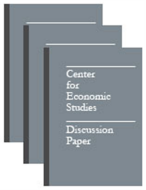Family-Leave Mandates and Female Labor at U.S. Firms: Evidence from a Trade Shock
Family-Leave Mandates and Female Labor at U.S. Firms: Evidence from a Trade Shock
Abstract
We study the role of family-leave mandates in shaping the gender composition at U.S. firms that experience a negative demand shock. In a regression discontinuity framework, we compare firms mandated to provide job-protected leave under the Family and Medical Leave Act (FMLA) and firms that are exempt from the law (non-FMLA) following the post-2001 surge in Chinese imports. Using confidential microdata on matched employers and employees in the U.S. non-farm private sector, we find that between 2000 and 2003, an increase in import competition decreases the share of female workers at FMLA compared to non-FMLA firms. The negative differential effect is driven by female workers in prime childbearing years, with less than college education, and is strongest at firms with all male managers. We find similar patterns in changes in the female share of earnings and promotions. These results are consistent with the presence of traditional gender norms that assign primary care-giving responsibilities at home to women.
Others in Series
Working Paper
Working Paper
Working Paper




